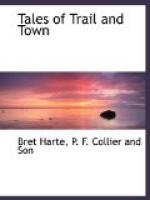What happened after this, and how long it lasted, they never knew. For, hurried along with increasing momentum, but always mechanically clutching at the snow, and bounding from it as they swept on, they sometimes lost breath, and even consciousness. At times they were half suffocated in rolling masses of drift, and again free and skimming over its arrested surface, but always falling, as it seemed to them, almost perpendicularly. In one of these shocks they seemed to be going through a thicket of underbrush; but Provy Smith knew that they were the tops of pine-trees. At last there was one shock longer and lasting, followed by a deepening thunder below them. The avalanche had struck a ledge in the mountain side, and precipitated its lower part into the valley.
Then everything was still, until Provy heard Julian’s voice calling. He answered, but there was no response from Tribbs. Had he gone over into the valley? They set up a despairing shout! A voice—a smothered one—that might be his, came apparently from the snow beneath them. They shouted again; the voice, vague and hollow, responded, but it was now surely his.
“Where are you?” screamed Provy.
“Down the chimbley.”
There was a black square of adobe sticking out of the snow near them. They ran to it. There was a hole. They peered down, but could see nothing at first but a faint glimmer.
“Come down, fellows! It ain’t far!” said Tribbs’s voice.
“Wot yer got there?” asked Julian cautiously.
“Suthin’ to eat.”
That was enough. In another instant Julian and Provy went down the chimney. What was a matter of fifteen feet after a thousand? Tribbs had already lit a candle by which they could see that they were in the cabin of some tunnel-man at work on the ridge. He had probably been in the tunnel when the avalanche fell, and escaped, though his cabin was buried. The three discoverers helped themselves to his larder. They laughed and ate as at a picnic, played cards, pretended it was a robber’s cave, and finally, wrapping themselves in the miner’s blankets, slept soundly, knowing where they were, and confident also that they could find the trail early the next morning. They did so, and without going to their homes came directly to school—having been absent about fifty hours. They were in high spirits, except for the thought of approaching punishment, never dreaming to evade it by anything miraculous in their adventures.
Such was briefly their story. Its truth was corroborated by the discovery of the bear’s carcass, by the testimony of the tunnel-man, who found his larder mysteriously ransacked in his buried cabin, and, above all, by the long white tongue that for many months hung from the ledge into the valley. Nobody thought the lanky Julian a hero,—least of all himself. Nobody suspected that Jackson Tribbs’s treatment of a “slide” had been gathered from experiments in his father’s “runs”—and he was glad they did not. The master’s pardon obtained, the three truants cared little for the opinion of Hemlock Hill. They knew themselves, that was enough.




